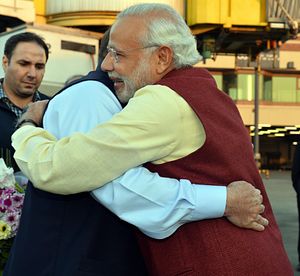On Thursday, Pakistan’s high commissioner in India, Abdul Basit, said that the India-Pakistan comprehensive bilateral dialogue would effectively be “suspended” in the wake of a Pakistani Joint Investigation Team’s (JIT) visit to India. “I think at present the peace process between India and Pakistan is suspended,” he said, concluding months of uneasy diplomacy. Basit’s remarks came shortly after the JIT investigated the Indian Air Force base at Pathankot, in Punjab, where terrorists that India alleges were Pakistani nationals staged an attack in January.
“As of now there is no date for the foreign secretary talks. I think you can say for now that the Comprehensive Bilateral Dialogue is suspended. Let’s see if we can commence the process,” Basit told reporters in New Delhi. The Indian Ministry of External Affairs, seemingly contradicting Basit’s description of the bilateral dialogue as “suspended” said that New Delhi and Islamabad were still trying to coordinate a date for a meeting between their foreign secretaries.
Basit’s remarks also discounted the idea of Pakistan offering any reciprocity toward Indian investigators for New Delhi allowing the JIT to visit Pathankot. “[The Indian Ministry of External Affairs] would like to clarify that on 26 March, 2016, before the visit of the JIT, the Indian High Commission formally conveyed to the Pakistani foreign ministry that the Terms of Reference ‘are broadly agreed to with the proviso that these would be on the basis of reciprocity and followed in accordance with extant legal provisions,'” Vikas Swarup, the Indian foreign ministry’s spokesperson, said, responding to Basit’s remarks. Pakistan’s decision to prohibit India’s National Investigation Agency from visiting Pakistan appears to have eroded the little diplomatic capital that remained after the JIT visit.
Toward the end of 2015, Indian Prime Minister Narendra Modi’s government initiated a period of outreach to Pakistan, beginning with a November meeting between the national security advisers of the two countries and culminating in December with an unannounced stopover by Modi in Lahore, to visit his Pakistani counterpart Nawaz Sharif. Though the two countries ended 2015 on an optimistic note, the goodwill was quickly scuttled after terrorists attacked the Pathankot air base in early January.
India and Pakistan postponed scheduled foreign secretary-level talks after the attack, as Indian waited for Pakistan to take action against the Pathankot terrorists. Indian intelligence suggested that the terrorists were members of Jaish-e-Mohammed, an anti-India terror group led by Masood Azhar. In response to the Indian allegations, Pakistan reportedly took Azhar into “protective custody,” and raided Jaish-e-Mohammed facilities. Pakistani authorities additionally filed a case against “unknown persons” involved in the attack in February.
In March, Sushma Swaraj, the Indian foreign minister, and Sartaj Aziz, adviser on foreign affairs to Pakistan’s prime minister, met in Pokhara, Nepal, at a ministerial summit for the South Asian Association for Regional Cooperation. However, the benefits of that meeting were short-lived. In the final days of March, Pakistani authorities arrested an Indian national, whom they claimed had carried out espionage activities for India’s external intelligence service, the Research and Analysis Wing (RAW). Kulbhushan Yadav, the alleged Indian spy, confessed to having worked for RAW on video, but Indian authorities denied that he was a spy and suggested that the video demonstrated that he had been tutored.
The sequence of events in India-Pakistan bilateral diplomacy, going back to the initial Bangkok meeting between their national security advisers, suggests a familiar pattern. Despite bona fide interest in talks and a return to the comprehensive bilateral dialogue on both sides, subconventional actors, operating with the implicit imprimatur of the Pakistani military and Inter-Services Intelligence (ISI), manage to spoil any sustainable attempts at peace.
Modi gambled considerable diplomatic capital on an overture to Pakistan, first with his stopover in Lahore and again with his government’s decision to work with the JIT at Pathankot. As Rohan Joshi, a contributor here at The Diplomat wrote in the Business Standard, the JIT visit was marred with difficulties and did not seem to restore any hope that post-Pathankot attempts at normal diplomatic talks would succeed. With Basit’s remarks, it appears that India and Pakistan are back to square one.

































